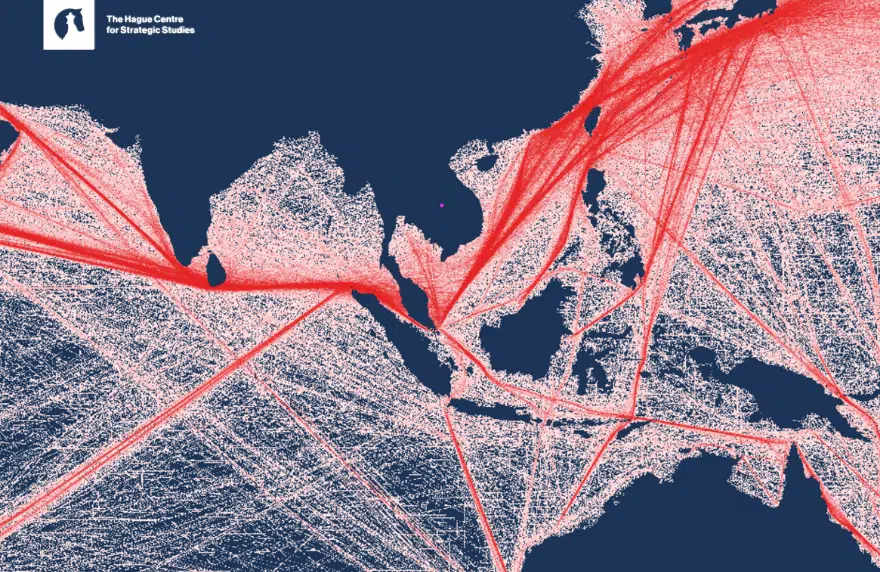The Indo-Pacific region has emerged as the epicentre of geopolitical competition, prompting Europeans to begin their own tilt towards the region. With China playing a more dominant role in the region, American supremacy has declined, posing a new challenge to European countries whose economic future and geopolitical relevance are linked to developments in the Indo-Pacific. However, it remains unclear what role Europeans should play in the Indo-Pacific given the modest size of the European navies compared to the US or China.
In this paper series edited by Senior Strategic analyst Paul van Hooft, six authors from across Europe, the US and Asia addressed the prospects and strategy of a European naval presence in the Indo-Pacific. The scholars explore the scope and focus of the European (EU) naval presence in the region and its effect, with a specific focus on the defence component of the Indo-Pacific tilt. Scholars also give their thoughts on the latest French, Dutch, German and British strategies for the Indo-Pacific and the meaning of future naval deployments in the region.
The series:
William D. James. Tailored, tokenistic, or too much? Assessing the Royal Navy’s presence in the Indo-Pacific. February 28, 2023.
In the United Kingdom, there is a lively debate over the utility of its ‘tilt’ to the region, first announced in the 2021 Integrated Review of Security, Defence, Development and Foreign Policy. This paper by William D. James (King’s College London) explores the rationale and efficacy of small or token defence deployments – with a specific focus on the defence component of the Indo-Pacific tilt. Its arguments challenge the assumption that tokenistic deployments are always a strategically unsound idea. This paper argues that the naval effort in the Indo-Pacific – as currently constituted – will not cause undue strain on the UK’s broader defence efforts in the Euro-Atlantic. Furthermore, and contrary to conventional wisdom, it argues that tokenistic naval deployments can be worthwhile – so long as the objectives are clear, expectations are managed, and they are integrated with allied and partner navies.
Collin Koh. Towards a Sustainable and Meaningful European Naval Presence in the Indo-Pacific Region: A Southeast Asian Perspective. March 8, 2023.
2021 was a bumper year for European naval presence in the Indo-Pacific. In that year alone, the United Kingdom carrier strike group 21 centred on the HMS Queen Elizabeth (with the Dutch frigate HNLMS Evertsen alongside), the German frigate FGS Bayern and the French nuclear-powered attack submarine FS Emeraude and Jeanne D’Arc task force traversed the region and took part in various military engagements. This policy brief by Collin Koh (S. Rajaratnam School of International Studies) examines, from a Southeast Asian perspective, prospects and challenges facing the viability of future European naval presence in the Indo-Pacific. It argues that notwithstanding varying perceptions within Southeast Asia, the region remains generally receptive of European naval presence. Given the extant uncertainties surrounding the war in Ukraine that could cast doubts in the Indo-Pacific about the durability of this presence, this paper proposes maintaining the status quo of European powers flying their national flags while representing a general form of European naval presence in the Indo-Pacific at least for the time being.
Eva Pejsova. The EU’s Naval Presence in the Indo-Pacific: What Is It Worth? March 13, 2023.
Recent years have seen an unprecedent concentration of European interest – and warships – in the Indo-Pacific. This paper by Eva Pejsova (The Brussels School of Governance) asks what has been the scope and focus of the European (EU) naval presence in the Indo-Pacific and what has been its effect? This paper looks at the rationales and specificities of the naval deployments of France, Germany and the Netherlands in the Indo-Pacific in the context of Brussels’ recent official tilt towards the region in 2021. It analyzes the responses of partners, including China and the US, before assessing their overall contribution to the regional strategic dynamic. Pejsova concludes that as limited as the EU’s contribution may be from an operational viewpoint, the European naval presence remains an important tool of diplomatic signalling both externally and internally.
Nicolas Mazzucchi. The French Strategy for the Indo-Pacific and the issue of European cooperation. April 3, 2023.
French presidential speeches in the Indo-Pacific from 2018 to 2021, structured a vision of France’s role in the region, as both a local actor – with territories in both the Indian Ocean and the Pacific Ocean – and a global power able to propose diplomatic, economic and military cooperation for the Indo-Pacific countries. This paper by Nicolas Mazzucchi (French Navy Centre for Strategic Studies (CESM)) highlights how France’s orientation in the Indo-Pacific region is consistent with its global strategy: to act as a balancing power able to promote stability and peace in the context of growing tensions and global re-armament. Mazzucchi argues that France sees its role in the Indo-Pacific as promoting multilateralism and the rule of international law, a challenge that can only be achieved through a global approach combining diplomacy, defence and importantly, cooperation with partners in the region, European and Western allies.
Chung Sam-man. Analysis of and Recommendations for European Naval Presence in the Indo-Pacific Region. April 18, 2023.
As a way of walking a fine line in the Indo-Pacific region France published Indo-Pacific strategy paper in 2018, Germany and the Netherlands followed in September and November 2020 respectively. Due to the efforts of those three countries, the “EU Strategy for Cooperation in the Indo-Pacific” could be launched as an official strategy in 2021. In this paper Dr. Chung Sam-man (KIMS) argues that in order to effectively target maritime challenges in the Indo-Pacific, including traditional security threats and newer challenges like climate change, a coalition of the willing that includes European navies and the navies of reliable and voluntary countries in the region needs to be forged. This paper highlights how minilateral frameworks and cooperation rather than competition is recommended for the EU’s approach to the Indo-Pacific region.
Jonathan D. Caverley. A Man-of-War is the Best Ambassador: European Naval Deployments as Costly and Useful Diplomatic Signals. May 2, 2023.
European states appear willing to expend scarce resources on “presence” missions. In 2020, at the Shangri-La Conference, the Netherlands Minister of Defence committed to deploying a vessel to the Indo-Pacific every other year. This would represent committing a quarter of the Dutch Navy’s frigate sailing time to such operations. The EU strategy calls for increased regional presence, but given the modest resources, every deployment must count. This brief by Jonathan D. Caverley (United States Naval War College) argues that even modest navies—almost uniquely among foreign policy tools— can effectively perform diplomacy when used thoughtfully and judiciously by civilian political leaders. Caverley explores how to analyse the diplomatic benefits of a naval vessel. It concludes by recommending that, as the world enters a more competitive, even mercantile era, Europe should focus its diplomacy via gunboats to deterring the potential for gunboat diplomacy.
Paul van Hooft and Tim Sweijs. Why should Europe guard the Indo-Pacific maritime commons: Order, Access, or US hegemony? September 13, 2023.
Europe face difficult choices in the Indo-Pacific, as the Sino-American competition intensifies and the multilateral order that protects the freedom of the seas comes increasingly under threat. This paper argues that Europeans need to more clearly formulate their objectives and develop policies based on a realistic view of their capabilities before embarking on a long-term commitment in the Indo-Pacific. This paper examines three distinctive objectives (1) upholding the maritime order, (2) ensure that Europe maintains access to key Asian economies, and (3) support for U.S. hegemony. The authors also offer a number of solutions with which Europeans can compensate for their lack of naval capabilities and consider serious maritime engagement in the Indo-Pacific. For example, European states, like the UK and France, should more effectively share and pool infrastructure in the region and rotate their forces in and out.
This series was part of a HCSS Europe in the Indo-Pacific Hub (EIPH). The series was edited by Senior Strategic analyst Paul van Hooft. Some papers were also edited by PR and Communications Assistant, Alessandra Barrow. The series was coordinated with the assistance of Strategic Analyst, Benedetta Girardi.





